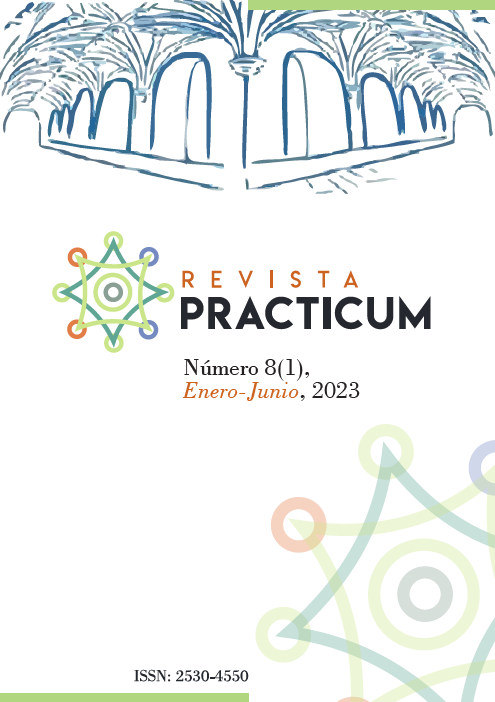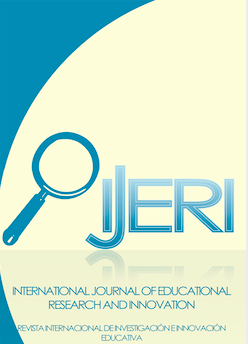Plataforma digital de autoevaluación de competencias docentes
DOI:
https://doi.org/10.24310/RevPracticumrep.v8i1.16717Palabras clave:
Evaluación del profesorado, Formación del profesorado basada en competencias, Prueba de competencia docente, Formación basada en competencias, Competencias docentesResumen
La educación está en proceso de transformación, con el uso masivo de la tecnología digital en las actividades de enseñanza y aprendizaje y, en este caso, identificar las competencias digitales para la enseñanza es una demanda social. Para ello, se desarrolló una plataforma de identificación y gestión de información, denominada CDD-EB, que almacena, de forma resumida, un modelo de autoevaluación de Competencias Digitales Docentes (CDD). El Modelo CDD-EB utiliza rúbricas que guían al docente en un proceso de autoevaluación, en el que habilita un proceso de autorreflexión individual y devuelve, en forma de retroalimentación en la propia plataforma, un resumen con el perfil CDD del docente, basado en sobre las elecciones realizadas. El modelo de autoevaluación fue validado por expertos, insertado en la Plataforma CDD-EB y probado por docentes de educación básica. Las pruebas de validez estadística, por IVC y CVC, y confiabilidad por Alfa de Cronbach, confirman el potencial de la Plataforma como herramienta para identificar competencias digitales docentes.
Descargas
Métricas
Publicación Facts
Perfil de revisores N/D
Información adicional autores
Indexado: {$indexList}
-
Indexado en
- Sociedad Académica/Grupo
- N/D
- Editora:
- Universidad de Málaga
Citas
Dzhurylo, A. P. & Shpayk, O. M. (2019). ICT Competence for secondary school teachers and students in the context of education informatization: global experience and challenges for ukraine. Information Technologies and Learning Tools, 70(2), 43–58. https://lib.iitta.gov.ua/716055/1/Dzhurylo_Shparyk_ICT_Competences.pdf
Espíndola, J. De. (2015). Percepção docente sobre os indicadores de competência digital [Programa de Pós-Graduação em Educação Matemática e Tecnológica. Universidade Federal de Pernambuco]. https://repositorio.ufpe.br/handle/123456789/13879
Gilioli, S., Melo, I. B. y Dias-Trindade, S. (2019). Avaliação do nível de proficiência digital de professores : um estudo no Estado de Tocantins Introdução. 13, 113–138. https://revista.unitins.br/index.php/humanidadeseinovacao/article/view/3419
Hazar, E. (2019). A comparison between European digital competence framework and the Turkish ICT curriculum. Universal Journal of Educational Research, 7(4), 954–962. https://doi.org/10.13189/ujer.2019.070406
Instituto Nacional de Estudos e Pesquisas Educacionais Anísio Texeira (INEP). (2021). Censo da Educação Básica 2020: resumo técnico [recurso eletrônico]. https://download.inep.gov.br/publicacoes/institucionais/estatisticas_e_indicadores/resumo_tecnico_censo_escolar_2020.pdf
Navarro, D. (2021). Apuntes de consistencia interna de las puntuaciones de un instrumento de medida. Universidad de Valencia, 5–10. https://www.uv.es/friasnav/AlfaCronbach.pdf
Neaves, N. I. I., Cruz, I. M. y Oviedo, L. H. M. (2017). Proceso De Validación De Una Rúbrica Diseñada Con El Enfoque Socioformativo. Congreso Nacional de Investigación Educativa-COMIE, 1–12. https://comie.org.mx/congreso/memoriaelectronica/v14/doc/2101.pdf
Perin, E. S. (2017). Competências Docentes Digitais para o compartilhamento de Práticas e Recursos Educacionais [Universidade Federal do Paraná.]. In Programa de Pós-Graduação em Gestão da Informação. https://seer.ufrgs.br/index.php/ProdutoProducao/article/view/9321
Rego, H., Da Hora, M., Torres, G., Monteiro, R. y Arica, J. (2010). Confiabilidade em Questionários para Qualidade: Um Estudo com o Coeficiente Alfa de Cronbach [Reliability in Questionnaires for Quality: a study with the Cronbach’s alpha Coefficient]. Produto & Produção, 11(2), 85–103.
Tarouco, L. M. R. (2019). Competências Digitais dos Professores. In TIC EDUCAÇÃO 2018: Pesquisa Sobre o Uso das Tecnologias de Informação e Comunicação nas Escolas Brasileiras (pp. 33–44). https://cetic.br/media/docs/publicacoes/216410120191105/tic_edu_2018_livro_eletronico.pdf
Vieira, S. (2015). Alfa de Cronbach. http://soniavieira.blogspot.com/2015/10/alfa-de-cronbach.html
Descargas
Archivos adicionales
Publicado
Cómo citar
Número
Sección
Licencia
La aceptación de la obra conlleva por parte del autor/a ceder a la Revista Prácticum en exclusiva los derechos de reproducción, distribución y venta de su obra en todo el mundo, tanto en formato digital como de papel, CD-rom, etc.
Igualmente los autores/as cederán a la Revista Prácticum los derechos de difusión, comunicación pública en internet y redes informáticas, buses de datos, como cualquier otro portal o dispositivo electrónico para consultas online de sus contenidos y extractos, y bajo las condiciones del portal, repositorios o la base de datos donde se halle la obra.
La Revista Prácticum anima a los autores la publicación y difusión de sus artículos y obras en sus páginas web personales, equipos de investigación, los repositorios institucionales y bases de datos científicas.
Todos los contenidos publicados en Revista Practicum están sujetos a la licencia Creative Commons Reconocimento-NoComercia-Compartirigual 4.0 cuyo texto completo puede consultar en <http://creativecommons.org/licenses/by-nc-sa/4.0>











8.png)








